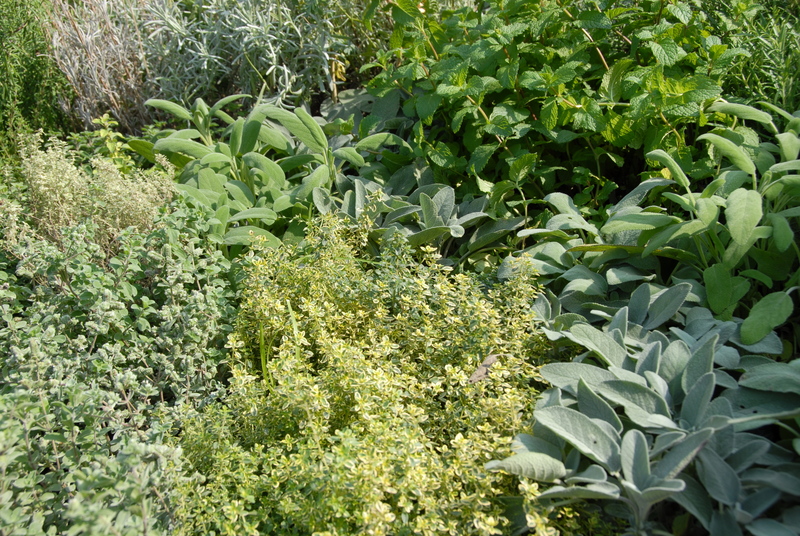Heighten your garden's impact in the climate change battle
Posted on 22/06/2025
Heighten Your Garden's Impact in the Climate Change Battle
Climate change is a pressing global issue, and every individual has a part to play in combating it. But did you know that your garden can be a powerful tool in this battle? This comprehensive guide will show you how to heighten your garden's impact in the climate change battle using sustainable practices, smart plant choices, and thoughtful design. Whether you have a sprawling backyard or a compact urban space, your gardening choices can help mitigate the effects of a warming planet and foster resilience in the face of environmental changes.
Understanding the Connection Between Gardening and Climate Change
Gardens are more than just beautiful spaces--they are dynamic ecosystems that influence the environment in numerous ways. By cultivating your garden thoughtfully, you can actively participate in the climate change solution. Here's how gardens impact the climate:
- Carbon Sequestration: Plants absorb carbon dioxide (CO2) during photosynthesis, reducing greenhouse gases in the atmosphere.
- Cooling Effects: Gardens provide natural shade and moisture, helping to lower local temperatures--a vital function as urban heat islands expand.
- Biodiversity Support: Home gardens can create habitats for pollinators and wildlife, strengthening ecosystem stability.
- Water Management: Healthy soils and plant roots can enhance rainfall absorption and reduce runoff, preventing floods and soil erosion.
Maximizing your garden's impact in the fight against climate change starts with understanding these benefits and implementing practices that bolster them.

Smart Strategies to Heighten Your Garden's Impact in the Climate Change Battle
1. Choose Climate-Resilient and Native Plants
One of the simplest, most effective ways to heighten your garden's environmental impact is planting species that are well-adapted to your local climate. Native plants require less water, fewer fertilizers, and fewer pesticides, which reduces carbon emissions and overall ecological footprint.
- Adaptability: Native plants are best suited to local weather patterns, soils, and pests.
- Support for Wildlife: These plants attract local pollinators, birds, and beneficial insects.
- Resilience: Native and climate-resilient species withstand drought, floods, and temperature extremes more successfully.
Tip: Visit a local nursery or agricultural extension office for advice on selecting the right native species for your area, boosting your garden's effect against climate change.
2. Improve Soil Health and Increase Carbon Storage
Healthy soil is a cornerstone for a thriving, climate-friendly garden. Soil acts as a massive carbon sink--more carbon is stored in soil than in the air and plant life combined. To maximize your garden's potential in the climate change battle, nurture your soil with these techniques:
- Composting: Recycle kitchen and garden waste into nutrient-rich compost, boosting soil health and reducing methane-emitting landfill waste.
- Mulching: Use organic mulches to lock in moisture, regulate temperature, and add organic matter to the soil.
- No-Dig Gardening: Minimize soil disturbance to maintain soil structure, promote beneficial microbes, and reduce CO2 release.
By focusing on soil health, you create a garden that not only absorbs carbon but also thrives with less water and fewer chemicals.
3. Opt for Low-Emission, Sustainable Gardening Practices
Sustainable gardening practices are key to lessening your garden's carbon footprint. Here are some strategies to help heighten your garden's contribution to battling climate change:
- Avoid Synthetic Chemicals: Chemical fertilizers and pesticides are energy-intensive to manufacture and can harm local ecosystems.
- Hand Tools Over Power Tools: Whenever possible, use manual equipment instead of gas-powered mowers and trimmers, which emit greenhouse gases.
- Rainwater Harvesting: Collect rainwater to irrigate your garden naturally, reducing dependency on municipal water supplies.
- Greywater Reuse: Safely reuse household water (such as from laundry or shower) for watering plants.
Pro Tip: Look for eco-friendly alternatives to regular garden products, such as organic pest repellents, biodegradable pots, and natural soil amendments, all of which help amplify your garden's impact.
4. Boost Biodiversity
Biodiversity is crucial in stabilizing gardens in the face of climate uncertainty. By fostering a diverse array of plant, animal, and insect life, you help create self-regulating garden ecosystems that are less vulnerable to the effects of climate change.
- Plant Variety: Grow a mix of annuals, perennials, shrubs, and trees to support varied wildlife and create year-round interest.
- Pollinator Gardens: Dedicate space for nectar-rich flowers and flowering herbs to attract bees, butterflies, and other vital pollinators.
- Habitat Features: Install birdbaths, insect hotels, log piles, and native hedges for shelter and nesting spots.
- Water Features: Even a small pond can support frogs, birds, and insects while helping to moderate temperatures.
In these ways, you can notably increase your garden's role in combating climate change while creating a lush, resilient green space.
5. Design for Water Efficiency and Flood Resilience
Water-wise garden design not only conserves a precious resource but also prepares your landscape for the unpredictable rainfall patterns linked to climate change. Consider these methods to reinforce your garden's impact:
- Drip Irrigation: Precisely waters roots and reduces evaporation compared to traditional sprinklers.
- Xeriscaping: Focuses on drought-tolerant plants and efficient design to minimize water use.
- Rain Gardens: Shallow basins planted with moisture-loving plants help absorb runoff and manage stormwater.
- Permeable Pathways: Gravel, wood chips, or permeable pavers allow rain to soak into the ground instead of causing erosion and flooding.
Heighten your garden's effect in the climate change battle by preparing it for both droughts and heavy rains, making it not just beautiful but also resilient.
Advanced Approaches to Amplify Your Garden's Climate-Fighting Power
Implement Agroecology Principles
Agroecology goes beyond organic gardening to integrate ecological science with social and economic aspects, making it more sustainable for both people and the planet. Apply some of these principles to your garden:
- Polycultures: Grow diverse crops and ornamental plants together to mimic natural ecosystems, reducing disease risk and improving yields.
- Succession Planting: Sequence plantings so that something is always growing and photosynthesizing, maximizing carbon drawdown.
- Integrated Pest Management: Combine biological, cultural, and mechanical controls rather than relying solely on chemicals.
With agroecology, your garden becomes a mini-ecosystem actively absorbing carbon and supporting biodiversity throughout the year.
Incorporate Trees and Vertical Gardening
Trees are among the most powerful tools for enhancing your garden's climate benefits. They sequester large amounts of carbon, provide shade, act as windbreaks, and support diverse wildlife. Vertical gardening (such as green walls and living fences) can also:
- Maximize Growing Space: Great for urban or small gardens where horizontal space is limited.
- Improve Insulation: Vertical plantings on walls can reduce indoor heating and cooling energy needs.
- Create Microclimates: Help moderate temperature extremes for sensitive plants.
Encourage Community Gardening and Food Security
Community gardens bring people together and multiply the effects of climate-friendly gardening. By pooling resources and knowledge, communities can:
- Reduce food miles by growing produce locally
- Share compost, seeds, tools, and rainwater systems
- Promote eco-education for sustainable gardening
Food security is also improved, as access to fresh produce grows, and gardens are managed in a climate-conscious way.
Adopt Renewable Energy and Smart Technology in the Garden
Integrating technology can further heighten your garden's fight against climate change. Consider these innovations:
- Solar-Powered Lights and Pumps: Use renewable energy to power garden features.
- Smart Irrigation Controllers: Automatically adapt watering schedules to weather and soil moisture, conserving water and energy.
- Remote Monitoring: Use sensors to track soil health, moisture, and air quality, allowing precise interventions for healthy, efficient growth.
Technology and green energy can transform your garden into a cutting-edge force for the environment.

Tips for Getting Started and Involving Others
Step-by-Step Guide to Maximizing Your Garden's Climate Impact
- Conduct a Garden Audit: Assess your current practices, water usage, and plant selections to identify improvement areas.
- Set Goals: Whether it's increasing biodiversity, reducing water use, or composting, clear targets help you track progress.
- Start Small: Choose one or two changes and expand as you learn. Even small steps can heighten your garden's effectiveness against climate change.
- Educate and Share: Talk to neighbors, family, and friends about what works in your garden, or get involved with community gardening projects.
- Observe and Adjust: Regularly monitor your garden's health and adapt your goals based on observed results and local climate events.
Resources and Further Reading
- Native Plant Societies: Provide plant lists, workshops, and events tailored to your region.
- Climate-Smart Gardening Guides: Many environmental agencies and nonprofits offer practical handbooks and toolkits online.
- Local Extension Offices: Cooperative extension services give tailored advice on low-impact gardening suited to your microclimate.
- Gardening Forums: Online communities enable passionate gardeners to swap tips on maximizing green spaces for climate action.
Explore these resources to deepen your knowledge and empower your efforts!
Conclusion: Your Garden as a Climate Hero
In the face of climate change, gardens have a remarkable power to heal, adapt, and inspire. By making informed, sustainable choices, you can heighten your garden's impact in the climate change battle. Small changes in how you design, plant, and maintain your garden create ripples that extend far beyond your fence line--making a real, tangible difference in the fight for a healthy planet.
As you nurture your green space, remember: every tree planted, every pollinator supported, and every drop of water conserved are steps towards a more resilient world. Heighten your garden's climate impact today and become a champion for tomorrow's environment!
Latest Posts
Conceive a Whimsical Outdoor Area for Children
Guide to Crafting Tranquil Seating Spaces in Your Garden
Design a Chic Garden with 5 Economical Low Maintenance Tips
Embrace Advanced Shapes in the Art of Hedge Trimming
Beginner's Toolkit: 9 Essential Tips to Kickstart Your Gardening

